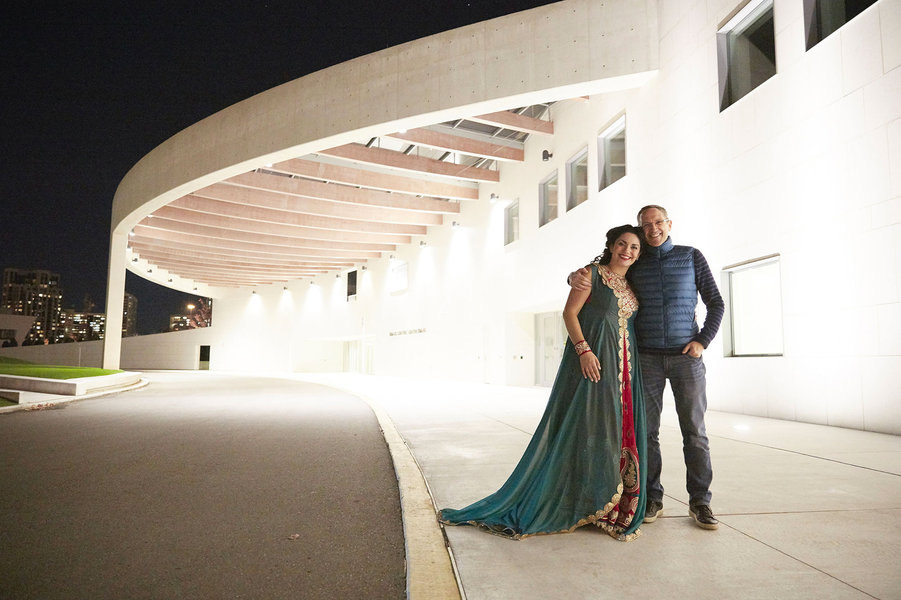Miram Khalil
Ayre Live
Against the Grain Ensemble
Against the Grain; CD, DL
There are few things more musically distressing than opera singers performing folk songs in full classical style. A dark tone and wide vibrato may work well for Wagner, but when applied to melodies meant for simpler delivery, the results often range from ridiculous to repulsive. What a relief, then, that Lebanese-Canadian soprano Miriam Khalil leaves such stultifying pretense at the door in her exquisite new recording of Osvaldo Golijov’s Ayre, recorded live by Toronto opera collective Against the Grain Theatre to launch their new record label.
Written in 2004 for Dawn Upshaw as a companion piece to Luciano Berio’s Folk Songs, Ayre is an assortment of texts and melodies gathered from all around the northern and eastern Mediterranean, with a few detours to Buenos Aires for good measure. Golijov, an Argentina-born Romanian Jew who studied composition in Jerusalem before moving to the United States, is better-suited than most to marshal these disparate materials, confidently setting Arabic, Sardinian, Ladino, Hebrew, and Spanish texts from the 1100s to the present day and cleverly showing how a few simple musical tweaks can transform a folksy klezmer tune into an elevated Islamic call to prayer, and thence to a Christian Easter hymn.
Miram Khalil and Osvaldo Golijov
Photograph: Darryl Block

Khalil is more than equal to the challenges of the resulting work. She delivers snarling dance numbers and playful foxlike yips, then pivots to plaintive lullabies and passages of religious ecstasy. In the liner notes, Khalil describes having grown up hearing several of the folksongs Golijov uses in the work, and this lifelong familiarity shows in her delivery; she sings this music with an authority rooted in her bones.
Even the language of the piece poses no difficulty: The eighth movement is a poem by Palestinian poet Mahmoud Darwish that is spoken without musical accompaniment. It’s usually recited in an English translation, but Khalil delivers it in the original Arabic, removing a language that has always felt like an alien intrusion into the fabric of the work and offering a subtle rebuke to English’s dominant position as an all-consuming international lingua franca.
While Khalil’s delivery is unforced and achingly direct, it is far from artless or unpolished. The final movement, “Ariadna en su laberinto,” in particular is a tour de force of effortless virtuosity. Much of the movement is given over to wordless vocalise that traverses the entire compass of Khalil’s voice—she ascends from her lush, velvety lower register to a rhapsodic cantillation over an octave above without missing a beat, delivering the winding, highly ornamented phrases with a graceful fluidity that belies the iron control necessary to execute the extended passage. Khalil’s ear for timbre is on display as well, as she alternately stands out from the backing ensemble and melts into it, at one point blending so perfectly with the horn that it’s impossible to tell where one ends and the other begins. The horn in question is played with striking sensitivity and finesse by Gabriel Radford, a standout performer in a consistently strong instrumental ensemble.
Miram Khalil performing ‘Ayre’
Photograph: Darryl Block

The fluidity on display in her smallest ornaments is also apparent on the largest scale in her approach to the entire work. Ayre’s eclectic sources can feel blocky in their juxtapositions, like buildings from different eras of a city thrown up with no compromise or eye to overall aesthetic cohesion. In Khalil’s rendition, the impression is more of a lived-in landscape, one where tree and grass and hill and oasis have melded together into an intricate network, no one part fully extricable from any of the others.
In this way, she makes Ayre feel like a piece for our time: Like the work’s creators with their hyphen-filled biographies, our communities are not isolated monoliths; we are all caught up in intricately tangled webs of historical relationships and contemporary interdependence. Khalil gives us an Ayre that respects these complexities, one that offers a vision not of eradicating difference or reducing it to anodyne interchangeability, but of letting different cultures and religions flourish together, each keeping their individual distinctiveness while collectively becoming a vibrant, life-affirming whole.
Brin Solomon writes words and music in several genres and is doing their best to queer all of them. Solomon majored in composition at Yale University before earning their MFA in Musical Theatre Writing at NYU/Tisch. Their full-length musical Window Full of Moths has been hailed for its “extraordinary songs” that “add magic to otherwise ordinary lives”, and their latest one-act, Have You Tried Not Being A Monster, has been described as “agitprop for Julia Serrano.” Their writing has appeared in VAN, New Classic LA, and National Sawdust Log, and they recently won runner-up at the 2018 Rubin Institute for Music Criticism.
Classical music coverage on National Sawdust Log is supported in part by a grant from the Rubin Institute for Music Criticism, the San Francisco Conservatory of Music, and the Ann and Gordon Getty Foundation. The Log makes all editorial decisions.